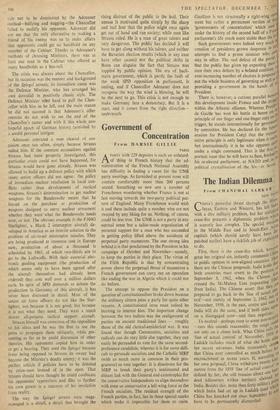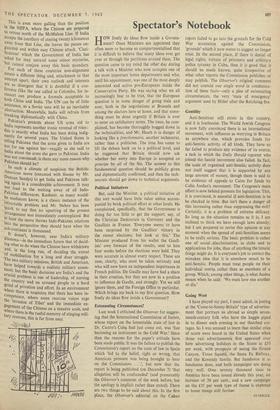The Indian Dilemma
From CHANCHAL SARKAR
NEW PliL CHINA'S powerful thrust through the Hi,,1.3. layas, Eastern and Western, has left Inu131 with a dire military problem, but her unriatCfati cease-fire presents a diplomatic problem wPicc is scarcely less complex. The special nnssi9.„1,-. to the Middle East and to South-East Asia capitals (which should surely have been ts'a patched earlier) have a ticklish job of exPlaill.— to do. ever First, there is the cease-fire which, 110,-,,,a great her original sin, instantly commends Crw'ri to public opinion in non-aligned countries. "0: t there are the Chinese proposals. India holds tn31 both countries must revert to the position(). September 8, 1962, when the Chinese °festt crossed the McMahon Line (separating 1-illre from India). The Chinese assert that they prepared to go back to the 'line of actual c°0"i trol'—not merely of September 2, 1962, but i if November, 1959, in the east, centre and west „ India will do the same, and if both sides agliA' on a disengaged zone--and then negotiate. rat To neutral—perhaps even to some non-neuci --ears this sounds reasonable; the snags stone out only on a closer look. What China calls tin 'line of actual control' of November, 1959',,er Ladakh includes much of what she holds a".0 b her recent advances. India strenuously derijet that China ever controlled as much before to encroachment in recent years. If, according.,o, her own proposal, China withdraws twenty _5 metres from the 1959 'line of actual control' 03.y defined by her, she still remains about one hilb dred kilometres within territory claimed sts India. Besides this, more than forty military P°0 which India had set up in Ladakh (and h - China has knocked out since September 8) have to be permanently dismantled. This is even more galling than the position in the NEFA, where the Chinese are prepared to retreat north of the McMahon Line. If India accepts the corollary of staying twenty kilometres away from that Line, she leaves the passes un- guarded and within easy Chinese attack. 'Clari- fications' which the Government of India has asked for may unravel some minor mysteries, but cannot conjure away this basic quandary. For each of these countries non-alignment means a different thing and, attachment to that concept apart, their own outlook and interests are so divergent that it is doubtful if a con- ference (like the one called in Colombo, for in- stance) can produce a formula acceptable to both China and India. The UN can be of little assistance, as a Soviet veto will be an inevitable obstruction. Meanwhile, India will refrain from breaking diplomatically with China. Pakistan's protests about US arms aid to India represents another ironic reversal of roles : this is exactly what India has been doing indig- nantly for several years. The United States is telling Pakistan that the arms given to India are not for use against her—exactly as she said to India about the arms she gave to Pakistan. India Was not convinced; is there any more reason why Pakistan should be?
In such a climate of suspicion the British- American move (executed with finesse by Mr. Duncan Sandys) to get India and Pakistan talk- ing again is a considerable achievement. It may not lead to the melting away of all Indo- Pakistan differences. Kashmir, as many would- be mediators know, is a classic instance of the intractable problem and Mr. Nehru has been quick to say that no upsetting of the present arrangement was immediately contemplated. But at least the move throws Indo-Pakistan relations into the perspective they should have when the sub-continent is threatened. It doesn't, however, ease India's military dilemma—in the immediate future that of decid- ing what to do when the Chinese have withdrawn and, in the long run, of deciding the extent of mobilisation for a long and dour struggle. The two military missions, British and American, have helped towards a realistic military assess- ment, but the basic decisions are India's and the crucial problem is one of leadership, of nursing the country and an aroused people to a hard grind of privation and effort. In an environment where there is suspicion that there has been in- competence, where some raucous voices urge the 'invasion of Tibet' and the immediate en- gagement of the Chinese on a massive scale, and where there is the rueful memory of stinging mili- tary reverses, this is far from easy.







































 Previous page
Previous page